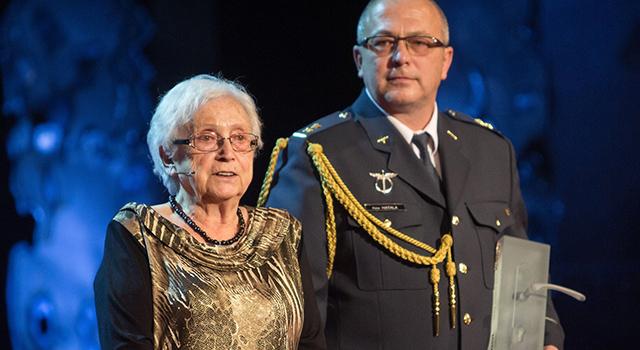Four anti-Nazi fighters received the Memory of Nations award in Prague

Four fighters against Nazism were awarded the Memory of Nations (Paměti národa) award in Prague yesterday, including two resistance fighters, a soldier who defended Tobruk, and a woman who escaped a death march. Jana Háková of the organizing association Post Bellum told the Czech News Agency that on the occasion of the 70th anniversary of the end of the Second World War, this year was dedicated to figures from the Czech Republic and Slovakia who stood up to Nazism.
Awardee Anna Hyndráková was her family’s sole survivor of the concentration camps. At the end of the war she managed to escape from a death march.
Awardee Lýdia Kovářová and her parents helped an entire group of resistance fighters hide out in a barn in the mountains of Slovakia. She saved the lives of one of the fighters and of her own family by hiding the fighter in a wardrobe after German soldiers unexpectedly raided their homestead.
Awardee Branislav Tvarožek also aided the resistance. He supplied food to the partisans and was involved in the Slovak National Uprising.
Tvarožek also managed to escape after he was captured by the Germans. After the war, however, a Communist court sent him to the uranium mines for five years.
The final awardee, Viktor Wellemín, is from a Jewish family and fled one month after the Nazi occupation to Palestine, where he joined the Czechoslovak military units in exile. He participated in defending the North African city of Tobruk.
Later at Dunkerque he was seriously injured by shrapnel during one of the biggest attacks by the Czechoslovaks on German positions. Despite his injuries he was still capable of aiding his dying friends.
The awardees found it difficult to speak when receiving their honors. They and the audience were visibly touched and some people in the theater wept.
Tvarožek called for reconciliation. He said we should never forget the words of the Lord’s Prayer about forgiving those who have trespassed against us.
"This year we are commemorating the 70th anniversary of the end of the Second World War and we have one of the last opportunities to express our appreciation to this most senior generation of witnesses who experienced either the Holocaust, the resistance, or the wartime front first-hand. In my opinion these stories are a message for the present and have a deeper meaning as well. They are about the self-sacrifice of aiding others, stories of an enormous strength to defend freedom and to resist," Mikuláš Kroupa, the director of Post Bellum, said.
During the course of the gala evening a short film about each laureate was presented as a montage edited by director Radim Špaček. This year the Memory of Nations award took the form of a door with a glass viewport for a handle.
"Doors are usually a banal, everyday thing, but at the same time they symbolize secrecy to me. Each of these laureates, at a certain moment, had to grab an imaginary door handle, open the door, and step through it even though they could not know what would happen next. Symbolically speaking, they basically were also lucky, they performed something essential and survived," said the designer of the award, Milan Cais, who is an artist and musician with the band Tata Bojs.
The Memory of Nations Award is given annually by Post Bellum to those who witnessed ground-breaking moments of the 20th century and "who have demonstrated through their lives that freedom, honor and human dignity are not empty words." Candidates for the award are chosen by historians and researchers from the stories told by witnesses and stored in the publicly-accessible online collection called Memory of the Nation (Paměť národa) that was established by Post Bellum in 2001 and currently contains almost 5 500 testimonies by witnesses from many European countries.